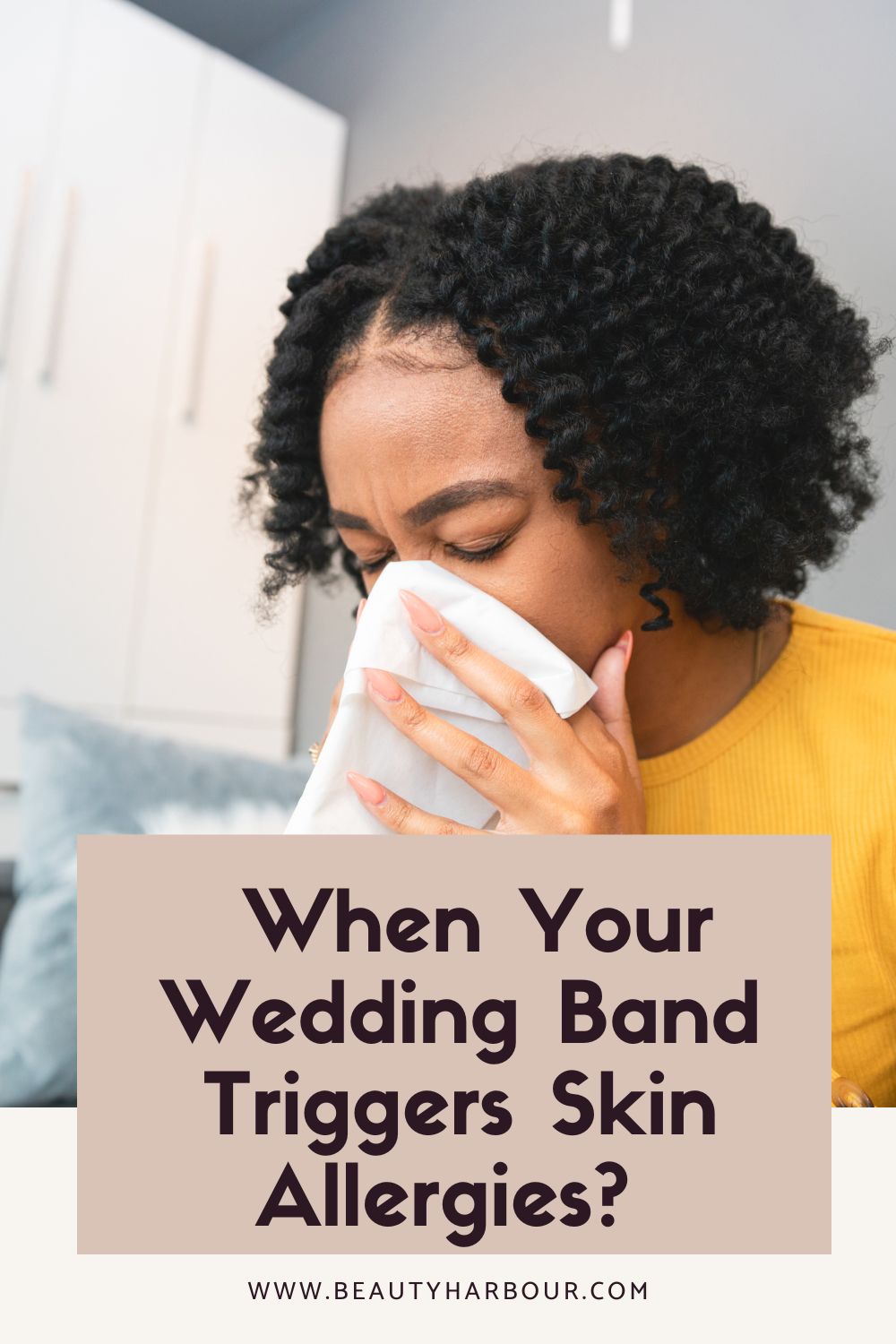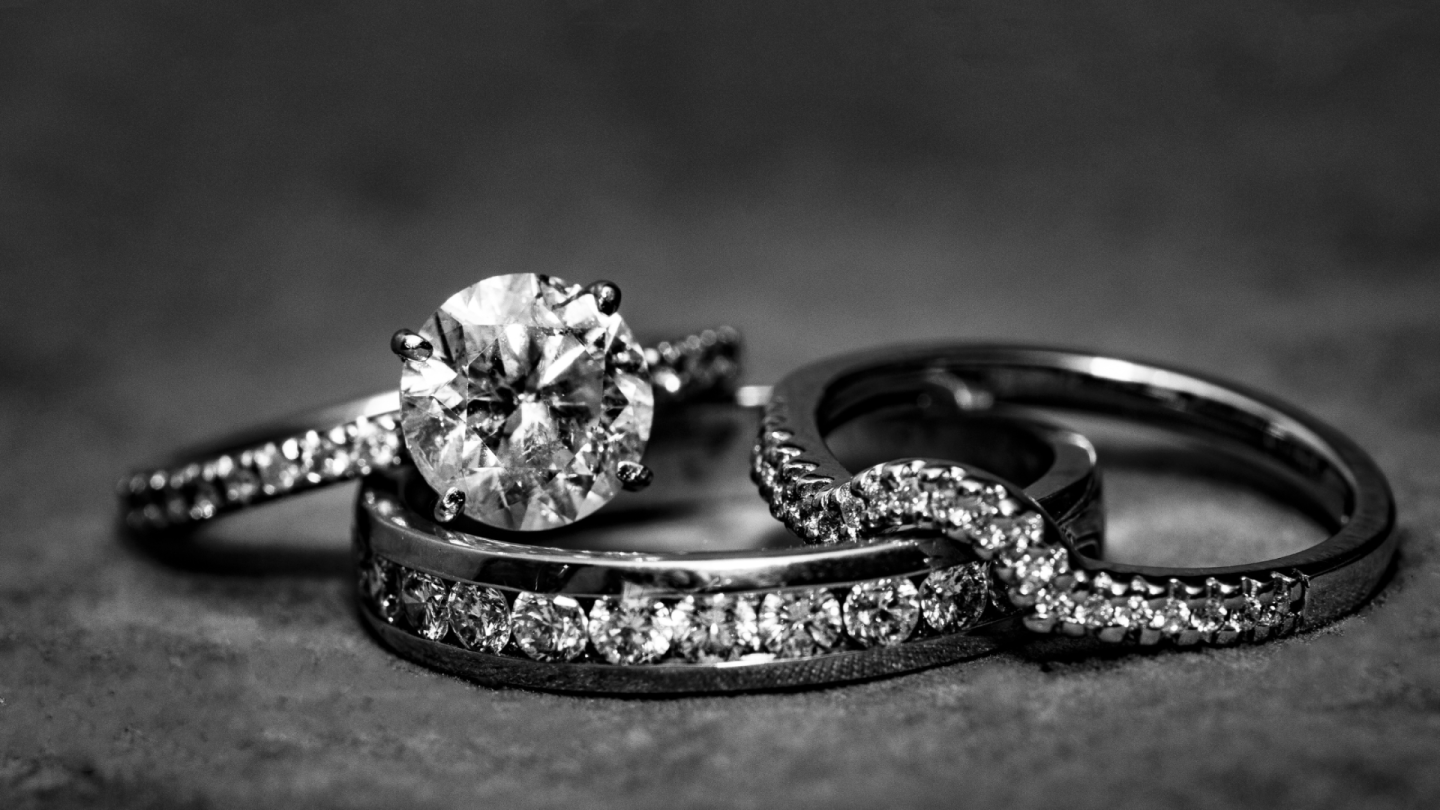
Many people with skin allergies have experienced some form of discomfort and reaction to their wedding bands after wearing them for some time. Usually, it is due to the nature of their wedding band material and the reaction it starts with their skin. However, you can choose wedding bands that won’t cause your skin to react unfavourably each time you wear your wedding band.
Wedding bands that are suitable for people with skins that react to certain metals, such as gold, nickel, and silver, are called hypoallergenic bands, and they are made from a range of materials, including titanium and platinum. These wedding bands offer aesthetic and cultural values but differ in price ranges.
This article will help you to know the wedding bands you can choose if the common traditional men’s wedding band materials react with your skin. You’ll also understand how skin allergies begin.
Understanding Skin Allergies Triggered by Wedding Bands
Not all wedding band materials are created equal, especially regarding skin sensitivity. Certain metals, such as nickel, cobalt, and chromium, commonly found in inexpensive jewelry, can cause allergic reactions in susceptible individuals. Other metals like white gold, often nickel alloyed, can also trigger allergies. Before purchasing, you must know these materials and their potential effects on your skin.
Skin allergies triggered by wedding bands occur due to an immune system response to specific substances present in the metal alloys. When the metal comes into contact with the skin, it can cause an allergic reaction, leading to various symptoms. These symptoms may range from mild irritation, redness, and itching to more severe reactions like blisters, rash, and even eczema. It’s crucial to understand that each individual’s reaction may vary, and what triggers an allergy in one person may not affect another.
Identifying Skin Allergies Caused by Wedding Bands
Recognizing the physical appearance of skin reactions caused by wedding bands is key to identifying a potential allergy. Generally, you’ll find the symptoms of skin allergies caused by wedding bands to be localized around the mens band. It may appear on the ring finger and the fingers beside it.
Here are some common symptoms you should be aware of:

Redness and Itching
One of the initial signs of a skin allergy is redness and itching in the area where the wedding band is in contact with the skin. This irritation can be uncomfortable and may worsen with prolonged exposure to the allergenic material. Usually, itching precedes redness; the more you scratch the itchy area, the redder and sore it becomes.
Swelling and Blisters
The affected area may experience swelling and develop small fluid-filled blisters in more severe cases. This can cause discomfort and pain, making it crucial to address the allergy promptly.
Rash and Eczema
Prolonged exposure to an allergenic wedding band material can develop a rash that may become dry, scaly, or even eczema. These conditions can significantly impact the appearance and health of your skin.
How to Prevent Skin Reaction to Wedding Band Materials
If you’ve endured the itching and redness your wedding band caused you for a while, you should stop it, the same way you’ll stop using a product if your skin is reacting to it. In many cases, it’s hard to let go of your wedding band, usually because they cost an arm and a leg or match your partner’s. You can enjoy your wedding band and never experience skin reactions to it through:
Allergen Testing
If you’re unfamiliar with the rashes and blemishes on your skin. It’s best to get an allergen test to ascertain the cause of your skin reactions. Usually, when jewelry and wedding bands are involved, the test reveals the wedding band materials your skin will react to, and the reaction can range from mild to severe for the different materials.
You may find that your skin reacts to all or some wedding band metals, including gold, silver, and nickel. With the result of your allergen test, you can choose a wedding band material that doesn’t trigger your skin reactions.
Coating and Plating
Coating or plating involves applying a thin layer of a different material onto the surface of the wedding band. This layer acts as a protective barrier, preventing direct contact between your skin and the potentially allergenic metal alloy underneath. As a result, the chances of developing a skin allergy, such as a wedding ring rash, or experiencing irritation decrease significantly.
Rhodium, a precious metal from the platinum group, is commonly used for plating wedding bands. It is an excellent choice due to its hypoallergenic properties and its ability to provide a durable and tarnish-resistant surface. Rhodium plating creates a brilliant, reflective white surface that enhances the band’s appearance while protecting the wearer’s skin.
Another option for plating wedding bands is using gold or silver. However, it’s important to note that these metals can still cause allergies in some individuals. Therefore, if you opt for gold or silver plating, make sure that the underlying metal alloy does not trigger allergic reactions such as nickel or cobalt.
Choose Hypoallergenic Metal Options

In cases where all metals that cause skin reactions affect you, you can opt for hypoallergenic metal options. They include the following:
Platinum
Considered the king of metals, platinum is naturally hypoallergenic and an excellent choice for men with sensitive skin. It is a durable metal that won’t tarnish, and its elegant white hue complements any style.
Palladium
Similar to platinum, palladium is a hypoallergenic metal that offers a great alternative. It shares many qualities with platinum, including its white color and durability, but at a more affordable price point.
Titanium
Titanium is a lightweight and durable metal that is also hypoallergenic. It has become increasingly popular for wedding bands due to its modern and stylish look. Titanium bands are available in various finishes, including matte, polished, and textured.
Tungsten Carbide
Tungsten carbide is another popular choice for men’s wedding bands. It is highly scratch-resistant and hypoallergenic, making it an excellent option for those with metal sensitivities. Tungsten carbide bands often have a sleek and contemporary appearance.
Choose Alternative Materials
In addition to hypoallergenic metals, alternative materials provide great options for men’s wedding bands. These wedding band materials offer unique aesthetics and contain no metals or alloys. They include:
Ceramic
Ceramic bands are lightweight, scratch-resistant, and hypoallergenic. They come in various colors, including black and white, and can be paired with other materials like wood or carbon fiber for a unique look.
Silicone
Silicone wedding bands have gained popularity due to their comfort and flexibility. They are hypoallergenic, affordable, and ideal for men with active lifestyles or working with their hands.
Wood
Wood bands offer a natural and rustic appeal. They are often made from hardwoods like koa, walnut, or ebony and are hypoallergenic, lightweight, and eco-friendly.
Conclusion
There are numerous options when selecting a wedding band for men with skin allergies. Hypoallergenic metals like platinum, palladium, titanium, and tungsten carbide provide durability and style without triggering allergic reactions. Alternatively, materials such as ceramic, silicone, and wood offer unique and contemporary choices for those seeking alternative options.
Remember, trying different styles and materials is essential to ensure comfort and the perfect match for your personal style. With these choices, men with skin allergies can confidently wear their wedding bands without worries on their special day and beyond.
Follow me on social media